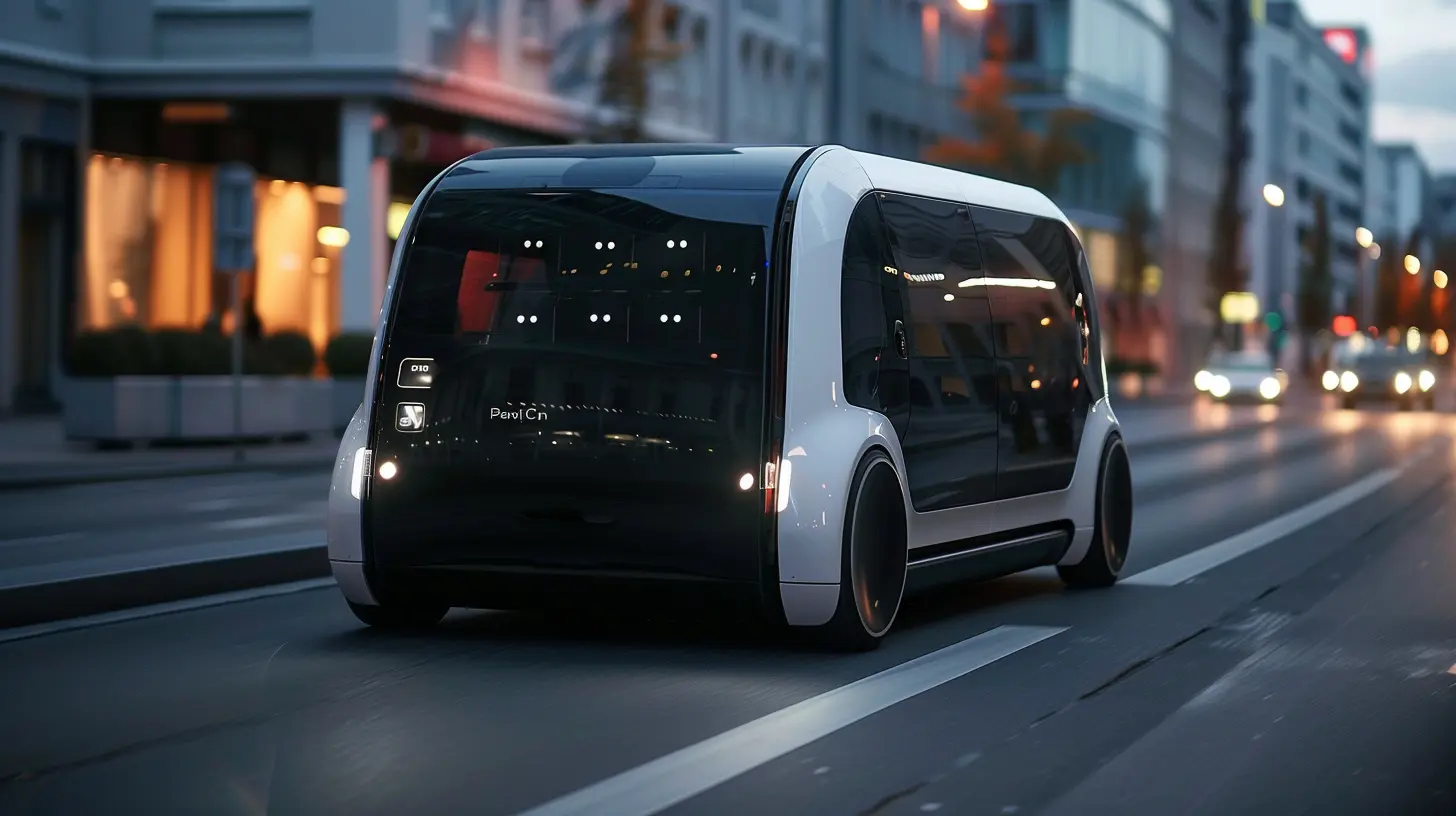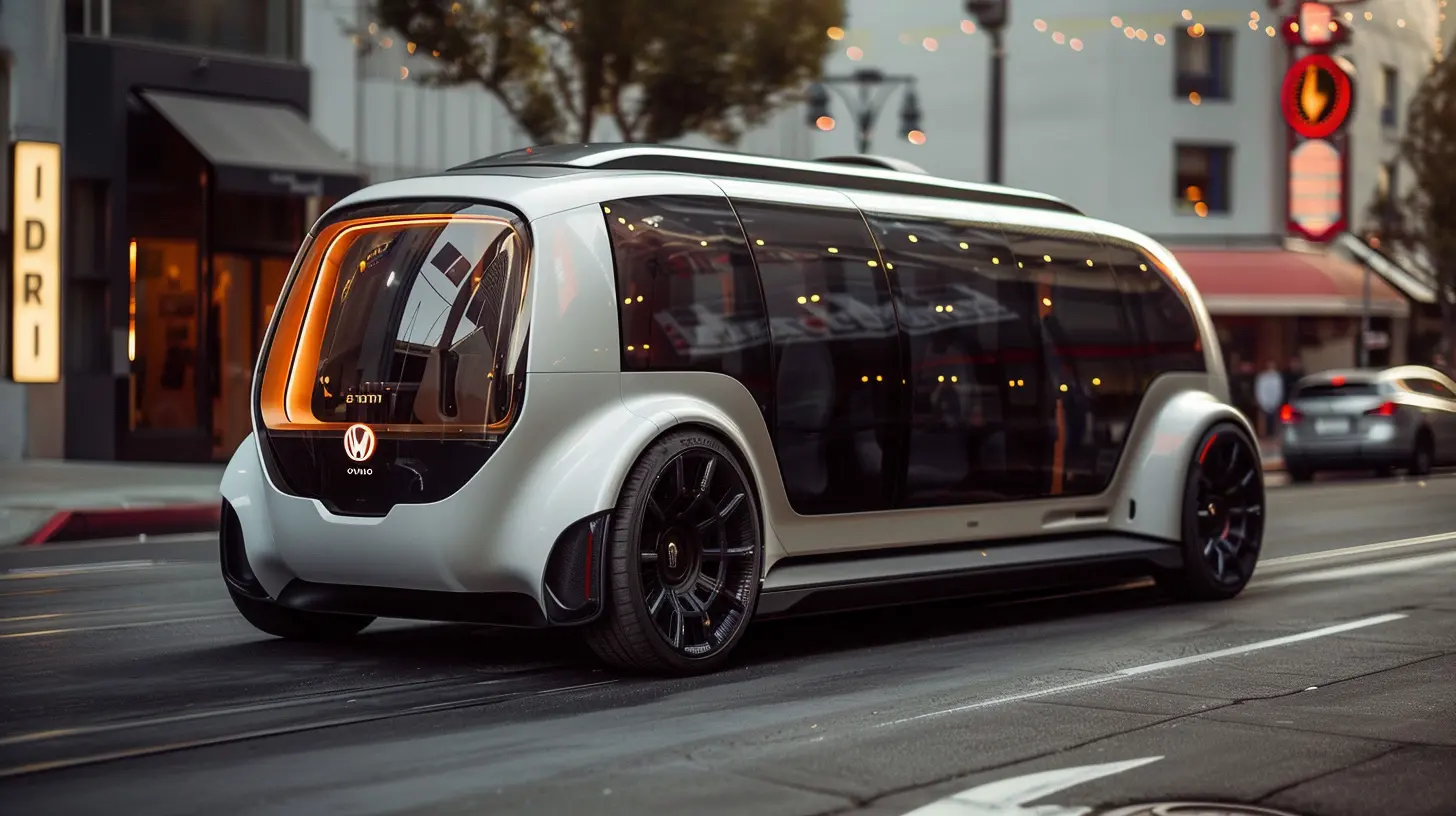AI in Autonomous Vehicles: Moving Toward Fully Self-Driving Cars
7 December 2024
The automotive industry is undergoing a massive transformation, and at the heart of this revolution is Artificial Intelligence (AI). From voice-activated assistants to predictive maintenance, AI is reshaping the way we interact with our vehicles. But the most ambitious leap? Fully self-driving cars, where AI takes the wheel—literally. Some automakers are already offering semi-autonomous features, but the ultimate goal is full autonomy—where the car drives itself, no human intervention required.
But how exactly does AI make this possible? And more importantly, how close are we to having self-driving cars as common as smartphones? Let’s dive into the world of AI in autonomous vehicles and explore what’s happening under the hood.

What Are Autonomous Vehicles?
Before we get into the nitty-gritty of AI, let’s make sure we’re all on the same page about what an autonomous vehicle (AV) really is. Simply put, an autonomous vehicle is a car that can operate without human intervention. Using a mix of sensors, cameras, radar, and AI-based software, these vehicles navigate roads, avoid obstacles, and make real-time decisions, just like a human driver would.To break it down, there are five levels of autonomy:
- Level 0: No automation. The driver is responsible for everything.
- Level 1: Driver assistance. Think adaptive cruise control or lane-keeping assist.
- Level 2: Partial automation. The car can control both steering and acceleration, but the driver must remain engaged.
- Level 3: Conditional automation. The car can handle most driving tasks, but the human needs to be ready to take over when necessary.
- Level 4: High automation. The car can perform all driving tasks in specific conditions or areas. No human intervention needed (but you can take over if you want).
- Level 5: Full automation. The car can drive itself anywhere, under any conditions, with zero human input.
We're currently somewhere between Levels 2 and 3, but the dream is to reach Level 5. So, what role does AI play in making that leap?

How AI Powers Autonomous Vehicles
AI is essentially the brain that makes autonomous vehicles possible. Think of it as the car’s decision-making engine. With the help of machine learning (ML), neural networks, and algorithms, AI processes the vast amounts of data collected by the vehicle’s sensors. It then makes split-second decisions—like when to brake, how fast to go, or which lane to switch to.AI and Sensor Fusion: Seeing the World Like a Human
For a self-driving car to navigate the world, it needs to "see" its environment. That’s where sensors come into play. Autonomous vehicles use a combination of:- Cameras (to visualize road signs, traffic lights, and obstacles)
- LiDAR (Light Detection and Ranging, to create 3D maps of the environment)
- Radar (to detect the speed and distance of objects)
- Ultrasonic sensors (to detect objects close to the vehicle)
AI integrates all of this data in a process called sensor fusion. It’s like how your brain combines information from your eyes, ears, and touch to understand what’s happening around you. The AI doesn’t just "see" what’s around it; it interprets that data to make informed decisions about how to move in real-time.
Machine Learning: Teaching the Car How to Drive
AI in autonomous vehicles isn’t just about hard-coded rules; it’s about learning. Machine learning, a subset of AI, allows cars to learn from experience. The more data an AV collects, the better it gets at making decisions.For example, when an autonomous vehicle encounters a pedestrian for the first time, it may rely on its pre-programmed rules to stop. However, as the car encounters more pedestrians in different scenarios—crossing at a red light, jaywalking, etc.—it learns to handle these situations more effectively. This is crucial for driving in complex environments where no two situations are exactly alike.
In essence, AI is like the car's driving instructor, constantly teaching it how to handle new challenges on the road.
Deep Learning: Recognizing Patterns and Making Predictions
Deep learning takes machine learning a step further. Imagine a self-driving car navigating a busy intersection; it has to identify other vehicles, pedestrians, traffic lights, and road signs. Deep learning algorithms enable the AI to recognize these patterns and predict what might happen next. Will that pedestrian cross the street? Is that car about to run a red light? Deep learning helps the AI anticipate these events and respond accordingly.It’s kind of like how we, as human drivers, anticipate what other drivers or pedestrians might do based on subtle cues. AI does this, too—except it can process way more information and react much faster than we ever could.

Key Challenges in Achieving Full Autonomy
AI might be incredibly powerful, but let’s be real—designing a fully self-driving car isn’t a walk in the park. There are some significant hurdles that need to be overcome before we reach Level 5 autonomy.Complex Driving Environments
One of the biggest challenges for AI in autonomous vehicles is navigating complex driving environments. City streets are a chaotic mix of cars, pedestrians, cyclists, and even the occasional runaway shopping cart. AI systems need to handle these unpredictable situations flawlessly, which is easier said than done.For example, how should a self-driving car respond when an emergency vehicle approaches? What if the road is partially blocked by construction? Human drivers often rely on intuition and experience to make quick, on-the-fly decisions. AI is still catching up in this department.
Weather Conditions
Weather is another big challenge. A sunny day? No problem. But throw in some heavy rain, snow, or fog, and things get tricky. Sensors like cameras and LiDAR can struggle in poor weather conditions, and even the most advanced AI struggles to interpret data accurately when visibility is reduced.In bad weather, human drivers can use their judgment and experience to adapt. AI systems, on the other hand, need to be trained to handle a wide range of environmental conditions, which takes time and a lot of data.
Ethical Dilemmas: The Trolley Problem
There’s also the ethical challenge—how should an AI handle life-or-death decisions? Imagine a scenario where a car has to choose between hitting a pedestrian who just stepped into the street or swerving into oncoming traffic. What’s the "right" choice? Should the car prioritize the safety of its passengers, or the lives of pedestrians?These ethical questions have been debated for years, and there’s still no clear answer. But for autonomous vehicles to gain public trust, these issues need to be addressed.
Regulatory and Legal Issues
Even if the technology becomes flawless, there's still the question of regulations. Who is responsible if a self-driving car gets into an accident—the manufacturer, the software developer, or the owner? Governments around the world are still figuring out how to create laws that accommodate autonomous vehicles.Until these legal and regulatory challenges are sorted out, full autonomy may remain a distant dream.

The Road Ahead: How Close Are We to Fully Self-Driving Cars?
So where are we on the road to Level 5 autonomy? Well, companies like Tesla, Waymo, and Uber are working tirelessly to make fully autonomous vehicles a reality. Tesla’s Autopilot is perhaps the most well-known semi-autonomous system, offering features like lane-keeping and adaptive cruise control.Waymo, a subsidiary of Alphabet (Google’s parent company), is one of the frontrunners in autonomous vehicle technology. They’ve been testing self-driving taxis in select U.S. cities, and while their cars are highly autonomous, they still require a safety driver in certain situations.
Despite the rapid pace of innovation, experts agree that fully self-driving cars are still at least a decade away from becoming mainstream. There’s a lot of progress to be made, particularly in solving the challenges we discussed earlier—complex environments, weather conditions, ethical dilemmas, and regulations.
But don’t lose hope! The advancements we’re seeing today are laying the groundwork for a future where self-driving cars are as common as, well, regular cars. In the meantime, we’ll continue to benefit from semi-autonomous features that make driving safer and more convenient.
Conclusion: The Future is Autonomous, But Patience is Key
AI is the driving force behind autonomous vehicles, and it’s clear that we’re on the path to a future where cars can drive themselves. While there are still significant challenges to overcome, the progress being made is nothing short of remarkable. From machine learning to sensor fusion, AI is making our roads safer and more efficient.But if you’re eager to hop into a fully self-driving car tomorrow, you might need to pump the brakes. We’re still a few years—or even decades—away from reaching full autonomy. In the meantime, enjoy the ride, because the journey toward fully self-driving cars is just as exciting as the destination.
all images in this post were generated using AI tools
Category:
Artificial IntelligenceAuthor:

Jerry Graham
Discussion
rate this article
17 comments
Taylor Miller
Oh great, self-driving cars! Just what we need—robots that can’t parallel park but can definitely ignore your yelling at the GPS. Progress, right?
February 11, 2025 at 7:36 PM

Jerry Graham
I appreciate your perspective! While self-driving technology has its challenges, ongoing advancements aim to enhance parking capabilities and overall navigation, making these vehicles safer and more efficient over time.
Roxie McClain
This article provides a compelling overview of the advancements in AI for autonomous vehicles. It highlights the promising technologies driving the shift toward fully self-driving cars while addressing the challenges that remain. Exciting times lie ahead as we approach a future where autonomous driving becomes the norm!
February 1, 2025 at 9:09 PM

Jerry Graham
Thank you for your positive feedback! I'm glad you found the overview insightful and exciting. The future of autonomous vehicles is indeed promising!
Wolf Reyes
Great insights on the progression of AI in autonomous vehicles! It’s exciting to see the advancements, but I wonder about the ethical implications and safety measures. As we move towards fully self-driving cars, it's crucial to ensure robust regulations and public trust in these technologies. Keep up the informative work!
January 26, 2025 at 5:28 AM

Jerry Graham
Thank you for your thoughtful comment! You're absolutely right—addressing ethical implications and ensuring safety measures are vital as we progress toward fully autonomous vehicles. Your insights on regulations and public trust are essential for the future of this technology.
Nora McMahon
Exciting progress ahead!
January 18, 2025 at 5:32 AM

Jerry Graham
Thank you! We're thrilled about the advancements in AI technology for autonomous vehicles!
Lanae Summers
AI in cars: finally a co-pilot that won't judge your Spotify choices! Just hope it doesn’t start suggesting pit stops at the nearest taco truck!
January 11, 2025 at 5:45 AM

Jerry Graham
Absolutely! With AI co-pilots, you'll get the perfect blend of assistance and non-judgment—just the way it should be! And who knows, a taco truck pit stop might just be a tasty suggestion!
Kael McCallum
Exciting innovations ahead! Can't wait for safer, smarter roads.
January 4, 2025 at 4:54 AM

Jerry Graham
Thank you! We're excited about the potential of AI to transform our roads into safer, smarter environments. Stay tuned for more updates!
Stephanie Lozano
This article captures the exciting advancements in AI for self-driving cars. While progress is impressive, real-world challenges remain before achieving full autonomy on our roads.
December 25, 2024 at 5:55 AM

Jerry Graham
Thank you for your insightful comment! Indeed, while advancements are remarkable, addressing real-world challenges is crucial for achieving true autonomy in self-driving cars.
Maddox Horne
This article beautifully captures the exciting progress in autonomous vehicle technology. The journey to fully self-driving cars is filled with challenges, but understanding AI's role helps us appreciate the innovation and safety improvements that lie ahead. Great read!
December 22, 2024 at 3:54 AM

Jerry Graham
Thank you for your thoughtful comment! I'm glad you enjoyed the article and appreciate the ongoing advancements in autonomous vehicle technology.
Onyx McGehee
Exciting advancements in AI for self-driving cars, but safety and ethics remain crucial challenges ahead.
December 15, 2024 at 8:01 PM

Jerry Graham
Thank you for your comment! You're absolutely right—while advancements in AI are promising, addressing safety and ethical concerns is essential for the successful deployment of fully autonomous vehicles.
Aelith Bishop
“Just remember, while self-driving cars may soon navigate traffic better than we do, they still won't know the difference between a 'quick pit stop' and a full-blown coffee break. Watch out for those unexpected detours to the nearest café—AI loves a good latte!”
December 11, 2024 at 12:32 PM

Jerry Graham
Great point! While AI enhances navigation, we still need to ensure it understands our human quirks—like the allure of a coffee break!
Giselle Turner
This article provides a solid overview of the advancements in AI for autonomous vehicles. However, it could delve deeper into the ethical implications and regulatory challenges that accompany the push for fully self-driving cars.
December 10, 2024 at 8:56 PM

Jerry Graham
Thank you for your insightful feedback! I appreciate your suggestion and will consider expanding on the ethical implications and regulatory challenges in future updates.
Brittany Foster
As we inch closer to fully autonomous vehicles, one must ponder: are we merely crafting machines to navigate our roads, or are we unwittingly steering ourselves toward uncharted ethical dilemmas?
December 10, 2024 at 1:59 PM

Jerry Graham
That's an insightful point. As we advance in autonomous vehicle technology, we must carefully consider the ethical implications and ensure responsible deployment alongside innovation.
Valeris Bowers
Promising advancements, but challenges remain.
December 10, 2024 at 4:31 AM

Jerry Graham
Thank you for your insight! While we're making significant strides in AI for autonomous vehicles, addressing the existing challenges is crucial for safe and reliable deployment.
Eva McKale
Great insights on the evolution of AI in autonomous vehicles! It's fascinating to see how advancements are shaping the future of transportation. Looking forward to more developments!
December 8, 2024 at 9:26 PM

Jerry Graham
Thank you! I'm glad you found the insights valuable. Exciting times lie ahead for AI in transportation!
Kenzie Cook
Exciting times ahead! Can't wait for the day when I can kick back and let my car handle the driving. 🚗✨
December 8, 2024 at 11:39 AM

Jerry Graham
Absolutely! The future of autonomous driving is just around the corner—exciting indeed! 🚗✨
Astra Kelly
The journey toward fully self-driving cars is not just a technological advancement; it's a revolution in mobility, safety, and accessibility. Embracing AI in autonomous vehicles signifies a future where innovation meets practicality, transforming our roads and lives. Let's accelerate toward a smarter, safer world—together!
December 8, 2024 at 5:34 AM

Jerry Graham
Thank you for your insightful comment! I completely agree that the integration of AI in autonomous vehicles is set to revolutionize mobility, safety, and accessibility, paving the way for a transformative future. Let's embrace this journey together!
Tracie Sweeney
Great article! It's fascinating to see how AI is shaping the future of autonomous vehicles and the potential it holds for safer roads.
December 7, 2024 at 4:55 AM

Jerry Graham
Thank you! I’m glad you found it fascinating. AI certainly has immense potential to enhance road safety and revolutionize transportation.
MORE POSTS

Smart TV Remote Controls: Do You Really Need Them Anymore?

Building Resilience: Disaster Recovery in Cloud Security

Advanced Audio Settings on Smart TVs: How to Enhance Your Sound

The Role of AI in Preventing Misinformation and Fake News

How to Stream Mobile Games to Your TV

Smart Home Security: Protect Your Space with Automated Systems

The Future of AI in Everyday Life: What to Expect

The Ethical Challenges of AI in Digital Transformation

The Evolution of Digital Assistants: From Voice Recognition to AI Mastery

How AI is Transforming the World of Gaming

How Digital Assistants are Leading the Charge in Smart Retail